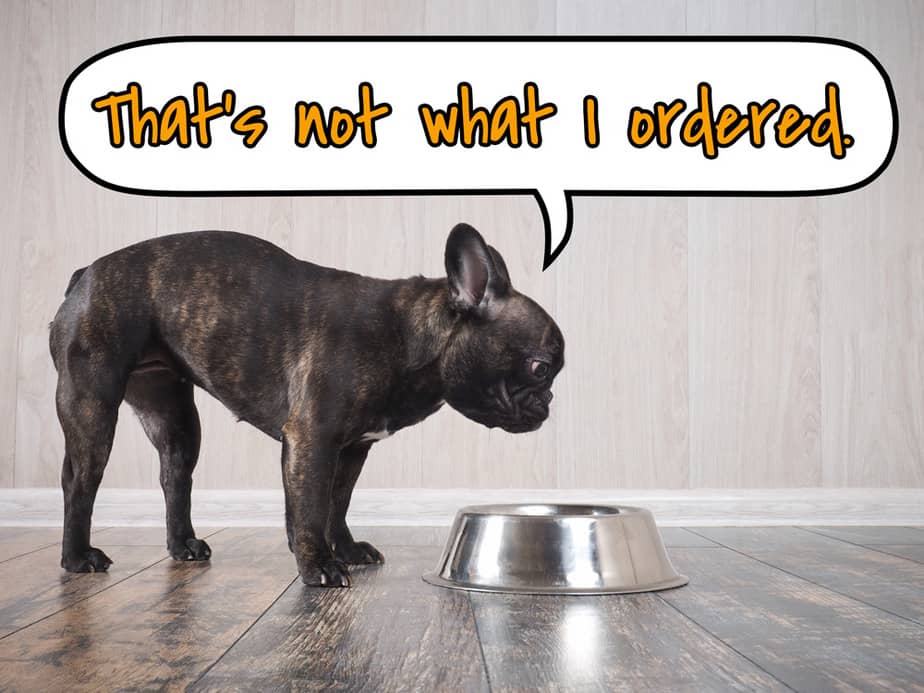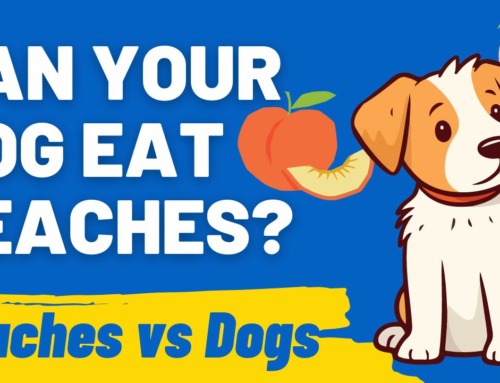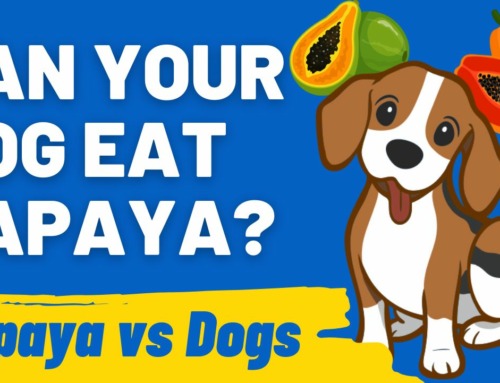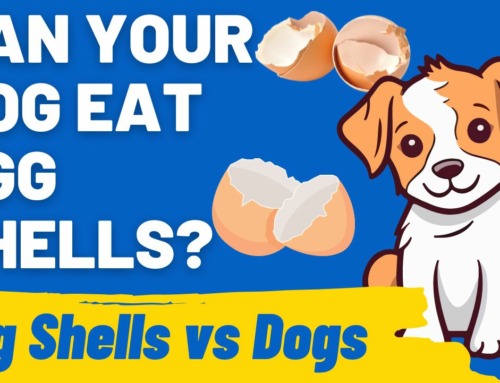It seems like all puppies should be eager to eat, but that’s not always the case. Some puppy owners may find themselves with a puppy that refuses to eat breakfast, but then eats later in the day.
Other times, it seems like some puppies appear to choose when to eat on a random schedule. If you’ve found yourself with a puppy that’s become a picky eater, you’ve found the right place – we’ll be covering the reasons that puppies may skip breakfast, as well as what you can do about it.
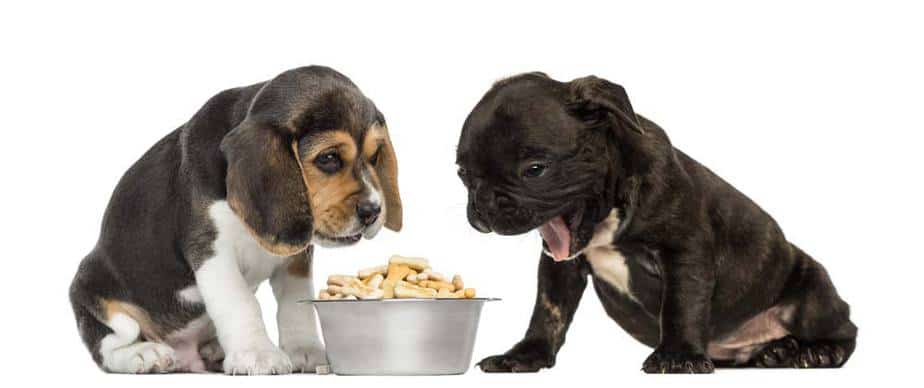
Why does my puppy skip breakfast?
There are a variety of health problems, such as internal parasites, that can cause a puppy to not want to eat. However, when your puppy is only skipping breakfast and then eagerly eats other meals throughout the day, it’s often a matter of behavior and not their physical health.
Some dogs are more finicky than others, and may need to be in the right mindset to eat. If this is the case for your puppy, it’s likely they will choose to skip breakfast, since they’ve just woken up for the day.
Picky dogs, or those that aren’t as food motivated as others, often need a reason to want to eat their food. Most commonly, some light exercise or mental stimulation helps them to feel hungry.
It’s also possible that you are feeding your puppy more food than they need, so they’re choosing to skip a meal.
Again, breakfast is the most likely meal for a dog to skip in this case.
Using a weight chart can help you determine if your puppy is gaining too much weight, or if they are truly under eating.
Some puppies may also go through an awkward phase of growth, where they appear to me much skinnier than they should be, such as many Boxers.
If your puppy has been skipping breakfast for a while and is still growing at a healthy weight, they likely just don’t need as much food as you are providing.
If your puppy is gaining weight, it’s also likely that you need to cut back on their meals.
If you notice that your puppy is skipping a variety of meals, or doesn’t eat their daily necessary calories by the end of the day, you should schedule a vet visit to determine if there’s a potential health concern causing your puppy to not feel as hungry.
Speaking of vets, did you know every 6 seconds a pet owner is faced with a vet bill of over $1000? Be sure to read our post, Is pet insurance worth it? 5 shocking facts you need to know…
When your puppy is only skipping breakfast and is eating the rest of their meals, though, you can try some of the techniques mentioned later in this article to encourage your puppy to eat at a designated time.
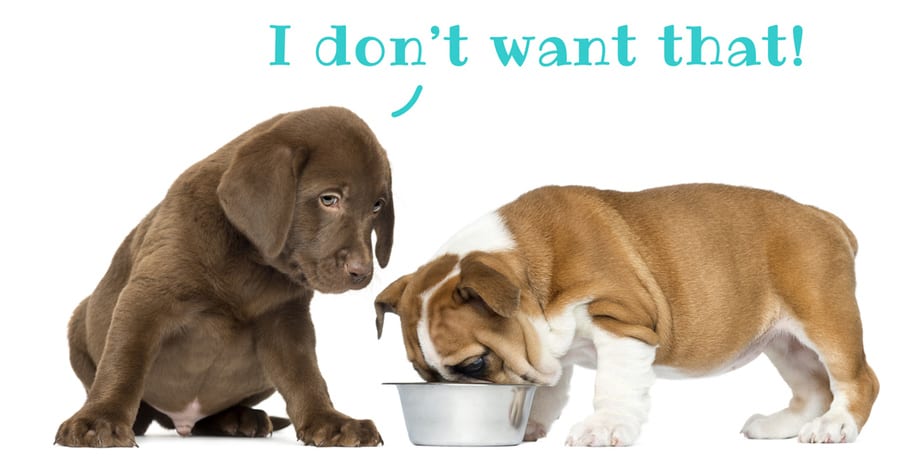
How to get your puppy to eat breakfast
If your puppy is too distracted in the morning, or just hasn’t had enough exercise to feel hungry, there are a few things you can try to encourage your puppy to eat their breakfast.
Changing your morning routine is often a great first step. Rather than feeding your puppy first thing when they are out of their crate, or setting down their food before they’ve had their morning walk, try something different.
For distracted puppies, they may do best being fed right before you leave for the day so they have had ample time to be excited about the new day and start to settle down.
Puppies that aren’t interested in food until they’ve had exercise may do best when provided with food after their walk or a short game of fetch.
Sometimes it’s not enough to change your feeding routine, though. A change in how food is provided may also be needed.
If your puppy struggles with eating their kibble, then be sure to read our post: My puppy won’t eat their kibble.
Also consider reading our post: Puppy Won’t Eat All Their Food.
Changing how your puppy eats
We don’t recommend adding wet food or other enticing goodies just to get your puppy to eat. In the majority of cases, your puppy will eat when they are hungry and will eat enough to be healthy.
CAUTION: If you get in the habit of offering your puppy food, and then adding something even better if they refuse, you can teach your puppy to hold out on eating in order to wait for something else to be added.
Instead of setting yourself up for a lifetime of having to trick your puppy into eating their meals, it’s best to stick just with plain kibble, as long as your puppy is maintaining a healthy weight.
A good way to encourage puppies to eat when food is provided is to teach them that food is only available for a short time.
When food is set down for the day, and your puppy can eat whenever they choose, they don’t have any reason to eat at a designated meal time.
What you can do instead is set your puppy’s meal out for 5-10 minutes. If they don’t want to eat, pick up their bowl and save it for the next meal time.
For some puppies, trying again in just an hour or two is enough time for them to feel hungry and want to eat. For other puppies, they may truly not want to eat until lunch or dinner time later in the day. (Again, if they’re still gaining weight and are healthy, then this is OK)
If your puppy is underweight and not eating, please read our post: Getting Puppy to Gain Weight
I’d also like to jump in here and mention that a fresh food service is a great option for picky eaters. You can read about one in our post, PetPlate: Should You Use It?
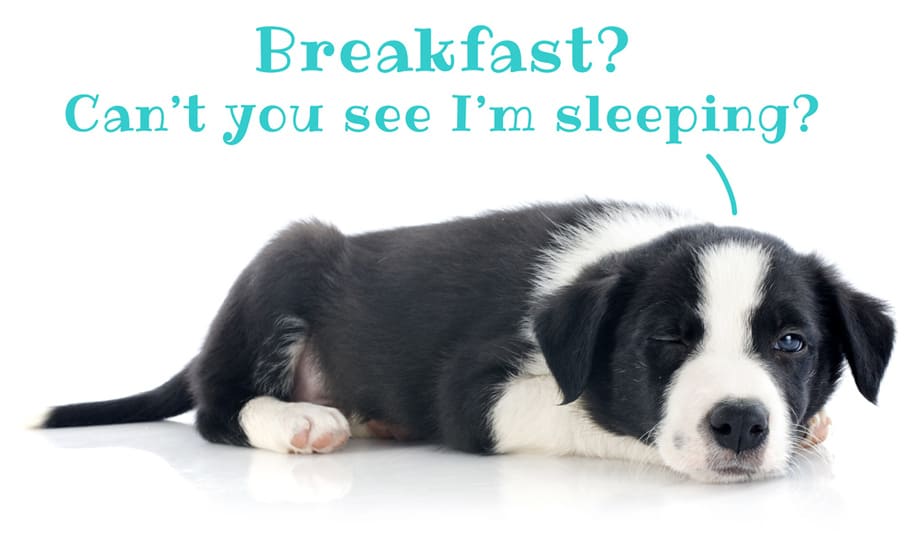
Spread out their meals
If your puppy doesn’t eat breakfast and you do take it away until the next mealtime, it’s important to remember to ensure they are still getting the full amount of food in the day.
For example, if your puppy needs to eat 1 cup a day in order to remain a healthy weight, you might have it split into ⅓ a cup each for breakfast, lunch, and dinner.
If your puppy skips their breakfast, you still need to make sure they eat that one-third of a cup at some point during their meals.
This might mean feeding ½ a cup each at lunch and dinner, instead of ⅓ of a cup three times a day, so your puppy still gets the whole 1 cup.
Again, though, as your puppy grows you will need to adjust the amount of food they eat. If you can only get your puppy to eat ⅔ of a cup per day and they are still growing and healthy, your puppy likely only needs ⅔ of a cup per day instead of 1 cup per day of food.
While free-feeding and leaving the food in the bowl all day may seem like a convenient option, there are some drawbacks.
- It can be harder to tell when your dog isn’t eating if you aren’t monitoring their meals,
- And you might miss early signs they are ill.
Having designated meal times is also useful when you are traveling or have other dog guests in your home!
Does my puppy need to eat breakfast?
No. If your puppy won’t eat breakfast, however is still gaining the required weight for their breed, then there is no negative side effects in not eating breakfast.
In many cases, there aren’t any negative side effects to skipping breakfast. Overweight dogs are a much more common problem than underweight dogs, as most dogs will overeat when given the chance rather than starve themselves.
Certain health conditions, such as diabetes, may make it necessary for your puppy to eat more frequently or at the designated time they need their medications.
However, if your puppy’s veterinarian hasn’t diagnosed them with any illness requiring frequent meals or needing a breakfast meal, then your dog’s choice to skip breakfast is OK.
We all know people who can’t start their day without breakfast, and those that are perfectly content to wait until lunch to start eating for the day. As is the case in people, dogs can have their individual personalities and quirks!
If you notice your puppy losing weight, not gaining a healthy amount of weight, or if you notice additional symptoms, it’s time to visit the vet.
Otherwise, your puppy might just not be awake enough or hungry enough in the morning to want breakfast and that’s OK!
A puppy who starves themselves usually has other health problems going on – a normal and healthy puppy should be able to eat enough food throughout the day to maintain a healthy weight.
The right choice for breakfast
Does your puppy eat their kibble at other times of the day?
If you find your puppy isn’t enjoying their food, we recommend Blue Buffalo Life Protection Puppy – as it’s a quality puppy meal that has no nasties and promotes healthy growth.

